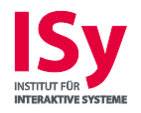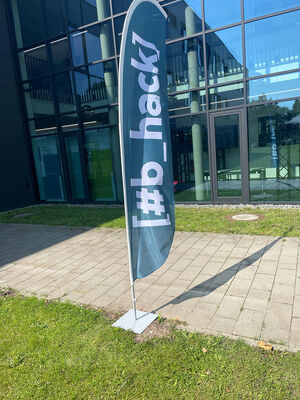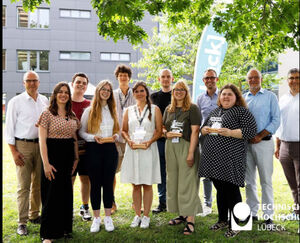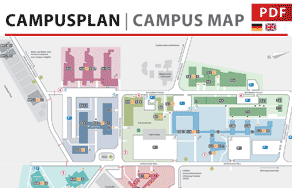Who are you and what kind of hackathon was it?
I am Sofie Ostrau, M.Sc. and a research assistant at the Institute for Interactive Systems at TH Lübeck. The #b_hack Hackathon, which took place at TH Lübeck from July 18 to 21, 2024, is an event that focuses on innovative solutions and developments that arise through collaboration and creativity. This year's hackathon was held under the motto "Bridging Borders, Shaping the Future". This weekend I participated together with Thorleif Harder and Monique Janneck. We each led a group made up of participants from the countries around the Baltic Sea.
How did you get involved in the event?
The hackathon offered the opportunity to get involved in one of eight different topics, depending on the skills and interests of the participants. I myself led a group that focused on sustainable tourism. Our project aims to bring the countries of the Baltic Sea region closer together by promoting sustainable tourism. The participants have designed a travel tool that shows creative ways to connect travelers across borders while protecting the environment.
Thorleif Harder led a group that developed a concept for an intercultural exchange platform for the Baltic Sea region. Young people from the countries of the Baltic Sea region often face challenges when it comes to communicating and interacting across cultural and linguistic boundaries. This project proposes the creation of a platform that builds digital bridges to bring together young people from different countries in the Baltic Sea region.
Monique Janneck led a group working on the development of prototypes for a sustainable future. In this workshop, the participants learned about the basics of human-centered design and developed a prototype that can contribute to achieving sustainability goals. Creative ideas were developed on how sustainability challenges can be tackled with the help of the prototype.
What did you take away from the event?
The collaboration in the international teams was inspiring and the different perspectives led to new, innovative approaches. I hope that some of the projects presented will be pursued beyond the hackathon.
One particularly positive aspect was the exchange with young people from different countries in the Baltic Sea region.
Name a highlight from the event
A particular highlight for me was the presentation of our group, where we presented our solution for sustainable tourism in the Baltic Sea region. We have developed a travel tool that demonstrates intuitive and sustainable travel options and strengthens connectivity across national and cultural borders. It was impressive to see how much we achieved in such a short time. The other groups also did a great job. It was inspiring to see how diverse the approaches and ideas were.
At the end of the hackathon, the teams evaluated each other and chose our group as the winner with the prototype of the "Sustay" app. The result is a prototype that shows users what voluntary and sustainable projects are available in a city.
Objective of the hackathon
The aim of the hackathon is to get IT-savvy young people interested in Baltic Sea cooperation, give them new networking opportunities and show them how they can get involved. Another aim is to develop innovative projects that have potential for use in the Baltic Sea region and enable broader youth and citizen participation. All ideas should be related to current thematic priorities in the Baltic Sea Region, the 2030 Agenda / Baltic 2030 Action Plan and the promotion of democracy and social relevance and resilience.






